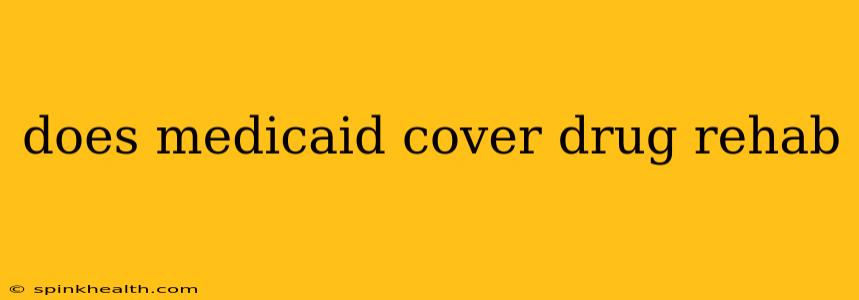The struggle with addiction is a deeply personal journey, and the financial burden often adds another layer of complexity. Many individuals and families wonder, "Does Medicaid cover drug rehab?" The short answer is: it depends. While Medicaid doesn't automatically cover every aspect of every rehab program, it can significantly alleviate the financial strain for many seeking help. Let's unravel the intricacies of Medicaid's coverage for drug rehabilitation.
My name is Sarah, and I've spent years working within the healthcare system, witnessing firsthand the challenges individuals face in accessing substance abuse treatment. This guide is based on my experience and extensive research, aiming to clarify the often confusing landscape of Medicaid coverage.
What is Medicaid?
Before diving into the specifics of drug rehab coverage, let's briefly define Medicaid. Medicaid is a joint state and federal government program providing healthcare coverage to millions of low-income Americans, including children, pregnant women, seniors, and individuals with disabilities. However, the specific services covered can vary significantly from state to state.
Does Medicaid Cover Drug Rehab? The State-by-State Reality
This is where things get nuanced. While the federal government mandates that Medicaid cover substance use disorder (SUD) treatment, the extent of that coverage is determined by individual states. Some states offer generous coverage encompassing inpatient, outpatient, and medication-assisted treatment (MAT) programs. Others may have more restrictive policies, focusing primarily on outpatient services or specific types of treatment.
What Types of Drug Rehab Does Medicaid Cover?
Medicaid coverage for drug rehab can include a range of services, depending on your state and individual needs. These may include:
- Inpatient Rehabilitation: This involves 24-hour care at a residential facility. Medicaid may cover the cost of room and board, medical care, therapy sessions, and other related services.
- Outpatient Rehabilitation: This includes treatment on an ambulatory basis. Medicaid may cover individual and group therapy, counseling, and medication management.
- Medication-Assisted Treatment (MAT): This combines medication with behavioral therapies to treat addiction. Medicaid may cover the cost of medication such as methadone, buprenorphine, or naltrexone.
- Detoxification (Detox): This is the initial phase of treatment, focusing on safely managing withdrawal symptoms. Medicaid may cover detox services in some cases.
It's crucial to note that even within these categories, specific programs or providers might not be covered. Medicaid often uses a network of providers, meaning you'll typically need to choose a rehab facility that participates in your state's Medicaid program.
How to Find Out if Your State’s Medicaid Covers Drug Rehab
The best way to determine the specifics of your state's Medicaid coverage for drug rehab is to:
- Contact your state's Medicaid office directly: Their website will usually have contact information, and they can provide the most accurate and up-to-date details about covered services.
- Check your state's Medicaid handbook: Many states publish comprehensive handbooks detailing their coverage policies.
- Contact potential rehab facilities: Many rehab facilities are familiar with Medicaid coverage guidelines and can advise you on whether they accept your specific state's Medicaid plan.
What if Medicaid Doesn't Fully Cover My Drug Rehab?
If Medicaid doesn't fully cover the cost of your chosen rehab program, several options may be available:
- Explore additional funding sources: Look into other programs that assist with addiction treatment, such as grants, charitable organizations, or private insurance (if you have a secondary policy).
- Negotiate payment plans: Some rehab facilities are willing to work with clients to create a payment plan that fits their budget.
- Seek assistance from a case manager or social worker: These professionals can help navigate the complexities of funding and resource allocation.
FAQs
Does Medicaid cover detox for drug addiction?
Medicaid's coverage of detox varies by state. While the federal government mandates coverage for substance use disorder treatment, including detox in many cases, the specifics are determined at the state level. Some states cover detox as part of a broader treatment plan, while others might not.
What kind of drug rehab programs does Medicaid cover?
The types of drug rehab programs covered by Medicaid vary from state to state. However, common services include inpatient and outpatient rehab, medication-assisted treatment (MAT), and counseling. Specific providers and programs must be in the Medicaid network for coverage.
How do I find a drug rehab facility that accepts Medicaid?
Contact your state's Medicaid office for a list of approved providers or use online search tools filtering for Medicaid-accepting facilities in your area. Remember that the selection of rehab facilities is restricted to those participating in your state's Medicaid program.
Remember, seeking help for addiction is a courageous step. Understanding the complexities of Medicaid coverage is a crucial aspect of this journey, but don't let financial concerns overshadow your need for treatment. The resources and assistance are available; take the first step toward recovery.

